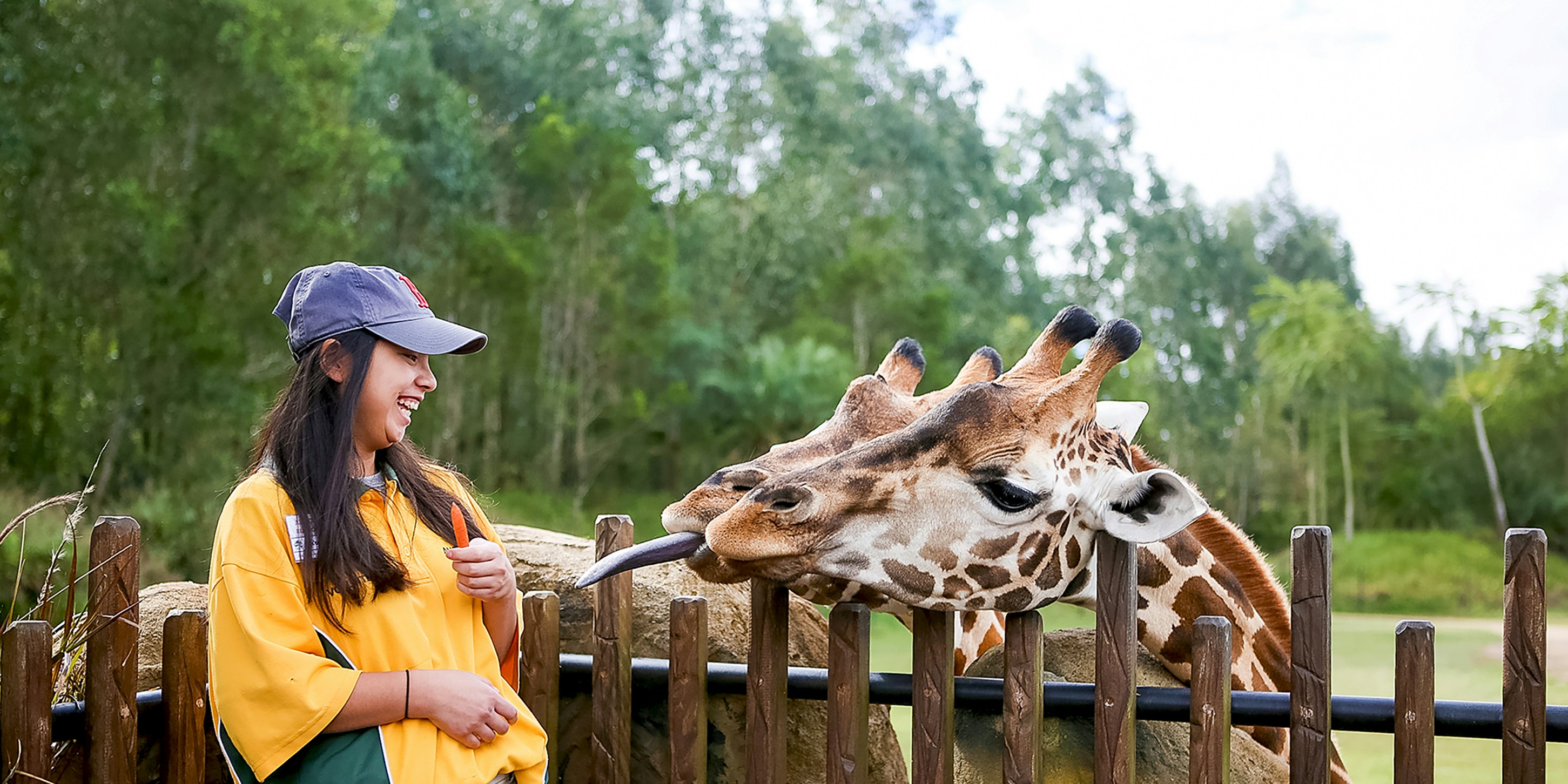
Travel this program in the future
| Find out when new dates are available |
Channel your passion for wildlife during this program designed for animal lovers interested in zoology, ecology, conservation, or veterinary science. After orientation, help prepare food and enrichment for amazing wildlife, watch keepers present guest talks, and assist with interactive animal enclosures. Volunteer alongside keepers perform a variety of tasks like gardening, mulching, pond scrubbing, raking, and poop scooping—it’s all part of the experience! Meet some of the majestic creatures that call Australia home and return home knowing what it’s really like to care for wildlife at a zoo.
| Service projects support UN Sustainable Development Goals |
 |
Similar Programs Available Now

Thailand: Thai Elephant Conservation Project
Elephant care and conservation
Age 12-21
$2995 plus Airfare
-
-
Country:
-
-
-
Department:
- Student Travel
-
-
-
Duration:
- 16 Days
-
-
-
Max. Students:
- 14
-
-
-
Ages:
- 14-18
-
-
-
Cost:
- $5,995 plus Airfare
-
-
-
Service Hours:
- 30
-
-
-
Program Types:
-
-
-
At-A-Glance:
-
Accomodation Amenities
Adventure/Physicality
Educational Activities
On-Program Travel
-
Packing the right gear (and the right amounts) is the first step to an incredible travel experience. Follow these tips to pack like a pro:
Travel light. Pack only the essentials. You’ll need less than you think!
Consider no checked bag. We strongly recommend that you consider packing only a carry-on size bag. This prevents your luggage getting lost or separated from you, keeps your bag manageable, and helps you be more mobile on your travel day.
Bring the right clothes. Pack clothes that are culturally appropriate for your destination and acceptable for service projects. This means bringing long shorts (think Bermuda and basketball shorts), t-shirts with sleeves to cover shoulders, and appropriate footwear.
Leave your valuables behind. While traveling, it’s easier for things to get lost, stolen, or damaged. Keep any prized possessions safe at home.
Check with TSA. Make sure your luggage complies with TSA regulations, especially your carry-on. Useful tip: Pack an empty water bottle and fill it up after security.
Extra paperwork? If you need additional forms filled out to get credit for your service hours, no problem! Bring these forms with you so they can be completed in-country.
A school backpack is ideal as it will be used for daily activities and outings.
- Passport
- Photocopy of passport
- Wallet and money (USD or AUD)
- Book and/or journal
- Pen
- Phone
- Camera
- iPod or MP3 player
- Change of clothes
- Water bottle
- Medication
- Visa documentation (if applicable)
- Camera
- Chargers
- Travel power adaptor
- Consent to Travel Letter (for students under 19, recommended by the US State Dept but not required)
- Rustic Pathways emergency contacts
- Arrival instructions for Brisbane
A 40-50 liter duffel bag or backpack is ideal.
Clothes
- Socks (8)
- Underwear (10)
- Pants/capris (2)
- Jeans (2)
- Long, loose-fitting shorts for service project work. Something that provides coverage and protection while keeping you cool (2)
- Shorts (3)
- Tank Tops (4)
- T-shirts (6)
- Sweater/fleece (2)
- Pajamas
- Swimsuit
- Bath towel
- Beach towel/sarong
- Rain jacket
- Fleece jacket
- Sandals or flip-flops
- Sneakers/running shoes (1)
- Sunglasses
- Hat
- Work gloves
Toiletries
(Travel size bottles in Ziploc bags)
- Shampoo
- Conditioner
- Body wash
- Face wash
- Toothbrush
- Toothpaste
- Oxybenzone-free sunscreen (reef-safe)
- Bug spray
- Contacts and solution
- Foam ear plugs
- Personal med kit
- Deodorant (no aerosols)
- Wet wipes
- Feminine hygiene products
- Razor/shaving cream
Miscellaneous
- Travel Pillow
- Headlamp with spare batteries
Optional
- Portable games (Bananagrams, cards, etc.)
- Musical instrument (guitar etc)
Items Provided By Rustic Pathways in Australia
- Linen at base house
- Other activity-specific equipment
During your time at Australia Zoo you will get to be primarily outdoors and on the days you are involved with keeper related activities, you will be involved in a variety of different hands on and physical activities.
Due to the working conditions & operational requirements, it will be important that you wear appropriate clothing and shoes for the 2 days that you are gaining experience with our keeping crew!
The following is an overview of clothing required:
Pants/Shorts – Either shorts or pants will be suitable for these days (skirts and dresses are not). Denim, jeans and legging styles are not suitable. It is recommended that you wear more durable and comfortable fabrics in a looser fit, such as cargos, chinos or standard cuts. All items of clothes worn during these two days should also be neutral tones, such as beige, grey, brown or black.
Closed-toed shoes – Make sure you bring comfortable, neutral colored shoes, as you will be walking and traveling through the zoo on a constant basis. It is not recommended that you wear your favorite or valuable shoes either, after all we are a zoo and there is a possibility they may come in contact with dirt, mud and yes – poo!
Jewelry /Accessories – Due to workplace health and safety we ask you keep jewelry to a minimum during your days assisting keeping departments. A watch, one pair of earring (small stud or sleeper style) and medical bracelets are permitted. Necklaces, facial piercings, rings, dress bracelets and large earrings are not suitable. We also recommend not wearing anything of significant value, as there is always a chance it may get dirty, broken or lost.
Mobile Phones – While mobile phones are now integral to our daily lives, they will not be permitted on the days you are assisting the keeping departments.
- While working in the zoo, you are required to bring black or khaki pants/long shorts. You should also pack either a black, blue, or green sweater/fleece that has no logos on it.




